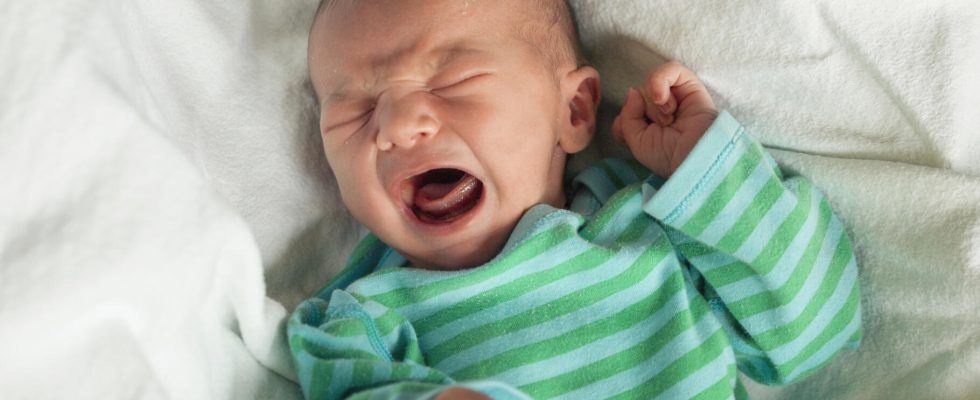Thanasis Zovoilis/Getty Images
Bronchiolitis is a respiratory viral infection that affects the small bronchi.
BRONCHIOLITIS – Only two regions still escape it. It has been two weeks since the bronchiolitis epidemic spread across most of France, after accelerating at the beginning of November.
And even if Public health France pointed out this Wednesday, November 15, a stabilization or even a decrease in the indicators monitored (emergency visits, SOS Doctors consultations), the government deemed it useful at the end of the week to recall the “good actions to protect your baby”.

Bronchiolitis is a respiratory viral infection that affects the small bronchi and affects the youngest. Although it is generally benign, it still affects 30% of children aged 1 month to 2 years each year. For HuffPostliberal pediatrician Andreas Werner, also president of the French Association of Ambulatory Pediatrics (AFPA), discusses the warning signs that should alert parents.
Signs of bronchiolitis
“Children with bronchiolitis often have a dry cough. This is the easiest sign to watch for.”, explains the pediatrician. Added to this are other symptoms: rapid breathing, difficulty exhaling which is accompanied by wheezing, a cold and sometimes fever. These signs may indicate that your baby has contracted bronchiolitis.
But the doctor reassures: “As long as the child sleeps well, eats well and plays with a smile, it’s not a worry. Even if he coughs and has symptoms. The majority of bronchiolitis are not serious.”

On the other hand, if your child has difficulty eating, it may be “a sign of seriousness”. But if this symptom is not accompanied by a runny nose or difficulty breathing, “there is no bronchiolitis”assures the doctor.
Other signs of seriousness according to Andreas Werner: “Pauses in breathing, discomfort, the fact that the baby is no longer eating anything… This indicates that you need to go to the emergency room. But very often parents have already consulted a doctor before reaching this point.”
Risk factors
To reduce the risks for your newborn, you can adopt certain behaviors. “A baby who spends his first winter in a nursery has almost a 100% risk of developing bronchiolitis”warns the pediatrician who therefore advises avoiding the community or places where there are people, such as supermarkets.

It also lists certain measures similar to those of Covid: ventilate the rooms, wash your hands well and wear a mask when you are a parent or even clean anything that has been in contact with another child.
Some are also more at risk than others, such as children younger than 6 weeks old. The pediatrician reminds that babies born with a serious problem or illness (cardiac or respiratory for example), or very premature babies, also have a greater risk of developing critical forms of bronchiolitis.
And when the baby has bronchiolitis?
Andreas Werner also gives some advice if your baby has contracted bronchiolitis. He recommends washing your nose well and splitting meals: “It is better to give twelve small meals instead of the usual six for a newborn.” And if you have to stop working to care for your sick child, you can benefit from dedicated days off.

Last year, bronchiolitis caused an unprecedented epidemic in more than a decade, sending tens of thousands of infants to hospital. The epidemic is currently less than at the same time in 2022 but several indicators – consultations with private doctors, visits to the emergency room – accelerated last week to return to the already high level of 2021.
One of the big questions is the effect that a new preventive treatment, Sanofi’s Beyfortus, will have. Initially offered to all babies born since February, it is currently reserved for maternity wards, pending new stocks.
Also see on HuffPost :

